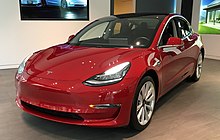
Back مركبات الوقود البديل Arabic Vehículo de combustible alternativo Spanish خودرو با سوخت جایگزین Persian Ajoneuvon vaihtoehtoiset polttoaineet Finnish Kendaraan bahan bakar alternatif ID Vehicul cu propulsie alternativă Romanian Альтернативное автомобильное топливо Russian Alternative fuel vehicle SIMPLE Альтернативне автомобільне паливо Ukrainian 新能源车 Chinese
An alternative fuel vehicle is a motor vehicle that runs on alternative fuel rather than traditional petroleum-based fossil fuels such as gasoline, petrodiesel or liquefied petroleum gas (autogas). The term typically refers to internal combustion engine vehicles or fuel cell vehicles that utilize synthetic renewable fuels such as biofuels (ethanol fuel, biodiesel and biogasoline), hydrogen fuel or so-called "Electrofuel". The term can also be used to describe an electric vehicle (particularly a battery electric vehicle or a solar vehicle), which should be more appropriately called an "alternative energy vehicle" or "new energy vehicle" as its propulsion actually rely on electricity rather than motor fuel.
Vehicle engines powered by gasoline/petrol first emerged in the 1860s and 1870s; they took until the 1930s to completely dominate the original "alternative" engines driven by steam (18th century), by gases (early 19th century), or by electricity (c. 1830s). Because of a combination of factors, such as environmental and health concerns including climate change and air pollution, high oil-prices and the potential for peak oil, development of cleaner alternative fuels and advanced power systems for vehicles has become a high priority for many governments and vehicle manufacturers around the world in recent years.
Hybrid electric vehicles such as the Toyota Prius are not actually alternative fuel vehicles, as they still use traditional fuels such as gasoline, but through advancement in electric battery/supercapacitor and motor-generator technologies, they have an overall better fuel efficiency than conventional combustion vehicles.[2] Other research and development efforts in alternative forms of power focus on developing plug-in electric, range extender and fuel cell vehicles, and even compressed-air vehicles.
An environmental analysis of the impacts of various vehicle-fuels extends beyond just operating efficiency and emissions, especially if a technology comes into wide use. A life-cycle assessment of a vehicle involves production and post-use considerations. In general, the lifecycle greenhouse gas emissions of battery-electric vehicles are lower than emissions from hydrogen, PHEV, hybrid, compressed natural gas, gasoline, and diesel vehicles.[3]
- ^ Cobb, Jeff (2017-01-31). "Tesla Model S Is World's Best-Selling Plug-in Car For Second Year In A Row". HybridCars.com. Retrieved 2017-01-31. See also detailed 2016 sales and cumulative global sales in the two graphs.
- ^ "Revealed - how the hybrid car "works" | Claverton Group". Claverton-energy.com. 2009-02-24. Retrieved 2010-12-12.
- ^ Cite error: The named reference
:1was invoked but never defined (see the help page).


